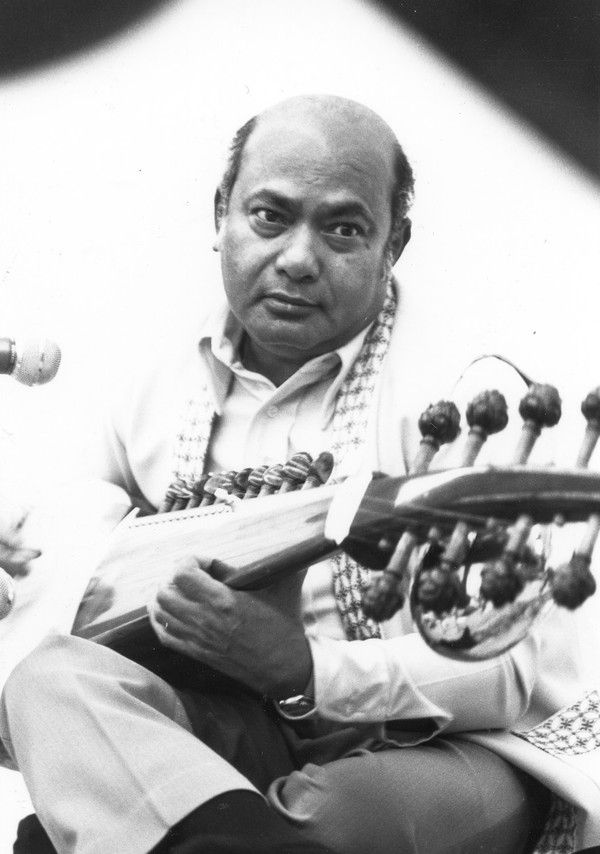Ustad Ali Akbar Khan: 7 Timeless Contributions of the Legendary Sarod Maestro
Ustad Ali Akbar Khan Introduction
Ustad Ali Akbar Khan, one of the greatest sarod players of all time, was a legendary Indian classical musician known for his deep, meditative, and soul-stirring performances. Revered as a master of Hindustani classical music, he was instrumental in popularizing Indian music across the world. With his unmatched talent and dedication, Ali Akbar Khan not only preserved India’s rich musical heritage but also trained countless students to carry forward his legacy.
This biography explores his life, contributions, and the profound impact he left on the world of music.
Ustad Ali Akbar Khan Early Life and Musical Training
Ustad Ali Akbar Khan was born on April 14, 1922, in Shibpur, Bangladesh (then British India). He belonged to a family deeply rooted in Indian classical music. His father, the legendary Ustad Allauddin Khan, was a strict yet loving guru who played a vital role in shaping his musical genius.
From a young age, Ali Akbar Khan underwent rigorous training in sarod, vocal music, and other instruments under his father’s strict guidance. His practice sessions often lasted for hours, ensuring he mastered every nuance of classical music.
Ustad Ali Akbar Khan Musical Career and Achievements
- First Performance and Recognition
- Ali Akbar Khan gave his first public performance at the age of 13, and by 22, he was already recognized as a prodigious talent.
- His breakthrough came in 1938, when he played for the All India Radio (AIR), earning nationwide recognition.
- Association with Pandit Ravi Shankar
- Ali Akbar Khan and Pandit Ravi Shankar collaborated extensively, introducing Indian classical music to the world stage.
- Their friendship and musical partnership helped popularize the sarod and sitar globally.
- Introduction of Indian Music to the West
- In 1955, Ali Akbar Khan became the first Indian musician to record an LP (long play record) in the United States.
- He also performed on American television, introducing Indian ragas to Western audiences.
- Establishing the Ali Akbar College of Music
- To pass on his knowledge, he founded the Ali Akbar College of Music in Kolkata (1956), California (1967), and Switzerland (1985).
- These institutions became the epicenter of Hindustani classical music education for both Indian and international students.
- Padma Vibhushan & Other Honors
- He was honored with the Padma Vibhushan (1989), India’s second-highest civilian award, for his contribution to music.
- He also received the MacArthur Fellowship (1991), often referred to as the “Genius Grant”.
- Innovations in Sarod Playing
- Ali Akbar Khan modified the structure of the sarod, enhancing its tonal quality and making it more versatile.
- His unique playing style combined strength, precision, and emotional depth, setting him apart from other musicians.
- Composing Timeless Music
- He composed music for films such as Satyajit Ray’s “Devi” (1960) and Merchant Ivory’s “The Householder” (1963).
- His compositions blended traditional Indian ragas with contemporary styles, making them universally appealing.
Ustad Ali Akbar Khan Impact on Daily Life and Society
Ustad Ali Akbar Khan’s music transcended cultural and geographical boundaries, bringing peace, solace, and joy to countless listeners.
- His soulful renditions of ragas had a calming effect, often used in meditation and relaxation practices.
- Many of his students, both in India and abroad, have gone on to become renowned musicians, ensuring the continuation of his legacy.
- His teachings emphasized discipline, dedication, and spirituality, values that extend beyond music into everyday life.
Ustad Ali Akbar Khan Legacy and Influence
Ali Akbar Khan’s influence on global music is immeasurable. His contributions include:
- Making Indian classical music accessible to Western audiences.
- Training some of the finest sarod players and vocalists of this generation.
- Ensuring the preservation of rare and complex ragas and compositions.
- Promoting cross-cultural musical collaborations.
Even after his passing on June 18, 2009, his music and teachings continue to inspire artists and audiences worldwide.
FAQs About Ustad Ali Akbar Khan
1. What made Ustad Ali Akbar Khan’s music unique?
His deep understanding of ragas, coupled with his ability to evoke emotions, made his music special.
2. What awards did Ali Akbar Khan receive?
He received the Padma Vibhushan, MacArthur Fellowship, and National Endowment for the Arts Fellowship, among many others.
3. How did he contribute to the global recognition of Indian music?
He was one of the first Indian musicians to record albums and perform internationally, making Indian classical music popular worldwide.
4. What is the significance of the Ali Akbar College of Music?
The institution has trained thousands of students in classical music, preserving traditional Indian art forms.
5. Who were some of his notable students?
Many renowned musicians, including Aashish Khan, George Harrison (of The Beatles), and Anoushka Shankar, have studied under him.
Final Thoughts: Ustad Ali Akbar Khan
Ustad Ali Akbar Khan was not just a musician; he was a musical phenomenon, a bridge between the past and the future of Indian classical music. His legacy remains alive through his recordings, students, and institutions.
His contribution to music and his ability to connect hearts through his melodies make him an eternal figure in Indian and world history. His sarod still sings, echoing through time, reminding us of his immortal genius.











Pretty section of content. I just stumbled upon your web site and in accession capital to assert that I get actually enjoyed account your blog posts. Any way I will be subscribing to your augment and even I achievement you access consistently rapidly.